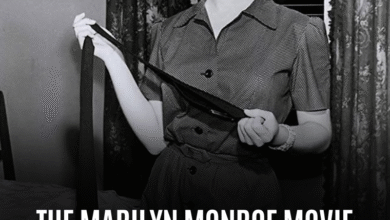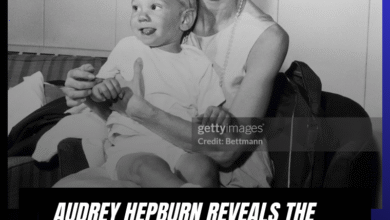The Audrey Hepburn You Don’t Know: From Heartbreak to Misunderstood Legacy
OPINION: This article may contain commentary which reflects the author's opinion.
Audrey Hepburn is one of the most iconic figures in cinema history, synonymous with grace, elegance, and the epitome of beauty. Her image has been immortalized in films like Breakfast at Tiffany’s and Funny Face, and her fashion collaborations with designer Hubert de Givenchy are still revered today. Yet, while many admire her for her poised public persona, the truth about Hepburn’s life and legacy is far more complicated and often misunderstood. Beneath the image of a flawless star is a woman who struggled with insecurities, personal pain, and societal challenges that are frequently overshadowed by her glamorous screen presence.
The Reality Behind the Perfection
Audrey Hepburn’s public image as the picture of grace and elegance often belied the deep personal insecurities and struggles she faced. From the trauma of her father’s abandonment when she was just six years old to the devastating impact of WWII on her early life, Hepburn carried emotional scars that would last throughout her career. In a 1992 Life magazine interview, she revealed how her father’s abandonment left her “insecure for life,” and this theme of vulnerability became central to her personal narrative.
Hepburn’s public image, as portrayed in documentaries like Audrey (2020), often paints a picture of a woman who lived a perfect life. However, this is far from the truth. She grappled with deep sadness, particularly related to her difficult marriages—first to actor Mel Ferrer, and later to Andrea Dotti, whose infidelities shattered her already fragile sense of self-worth. The Audrey documentary further explores her personal pain, including multiple miscarriages in the 1960s and her years of emotional hardship, much of which was kept hidden from the public eye. These intimate struggles stand in stark contrast to the polished and controlled image that Hepburn presented on-screen and in the media.
The Myth of the Happy Private Life
Audrey Hepburn’s life was often viewed through the lens of her impeccable public persona, suggesting a happy, serene existence. However, the reality was far more tumultuous. Hepburn’s deep sense of unfulfilled love and emotional isolation was felt most acutely in her relationships, where she struggled with feeling truly loved and supported. Her son, Sean Hepburn Ferrer, and others close to her revealed in interviews and documentaries the extent of her personal pain, including the heartbreaking discovery of her father 25 years after his abandonment—a reunion that was notably cold and strained. The image of Hepburn as a flawless icon often disregards the complexity of her private life, which was marred by loss, disappointment, and profound loneliness.
Debunking the Racism Claims
In recent years, discussions about Audrey Hepburn’s legacy have also turned to more controversial topics, such as her alleged racism. One key point of debate is her role in Breakfast at Tiffany’s (1961), in which Mickey Rooney’s portrayal of a Japanese character has been widely criticized for its racist undertones. Critics have argued that Hepburn’s silence regarding the problematic portrayal implies complicity, and some have even pointed to her dating history, noting that she did not publicly engage in relationships with Jewish or non-White men, as evidence of racial bias.
However, this interpretation of Hepburn’s personal and professional life oversimplifies the issue. As noted by commentators in a Reddit discussion and supported by biographical accounts, Hepburn’s romantic choices don’t automatically equate to racism, particularly considering the historical barriers to interracial relationships during her time. Additionally, Hepburn was notably vocal in her disapproval of “yellowface” roles, even turning down an offer to play an Asian character in Sayonara (1957). Her humanitarian work with UNICEF, particularly in Africa and South America, has also been consistently portrayed as motivated by her desire to help children rather than for publicity or personal gain. Hepburn’s wartime experiences—growing up in Nazi-occupied Holland—shaped her anti-racist views, challenging the notion that she harbored any racist beliefs.
The Misconception of Her Humanitarian Work
Hepburn’s humanitarian efforts, particularly her work with UNICEF, are often dismissed as mere publicity stunts or tax-saving measures. Critics have argued that her work in impoverished regions of Africa and South America lacked genuine compassion, but these claims are easily refuted. Hepburn herself expressed discomfort with fame, often stating that she did not seek attention for her charitable actions. Instead, she felt driven by the cause itself, particularly her desire to make a difference in the lives of children who were suffering from poverty and war. As noted in Reddit discussions and reinforced by several biographical accounts, Hepburn’s dedication to UNICEF was not a publicity tool but a sincere attempt to give back, driven by her own experiences of hardship during the war.
The Complex Legacy of Audrey Hepburn
Audrey Hepburn’s legacy is multifaceted. While her status as a fashion icon and Hollywood legend is undeniable, it’s crucial to recognize the layers of complexity that shaped her life and work. She was a woman of contradictions—elegant yet insecure, adored by the public yet deeply lonely, beloved for her humanitarian efforts yet often misunderstood for them. The oversimplification of her life as a flawless symbol of beauty and grace ignores the struggles she faced both on-screen and off, and diminishes the true depth of her character.
As we continue to celebrate Hepburn’s contributions to cinema, fashion, and charity, we must also acknowledge the pain, resilience, and humanity behind the image. She was more than just the slender silhouette draped in Givenchy—she was a woman who, despite her struggles, dedicated herself to making the world a better place for others. Hepburn’s legacy is ultimately defined not just by her timeless elegance, but by her ability to navigate a world of fame, personal turmoil, and global responsibility with grace and compassion.



